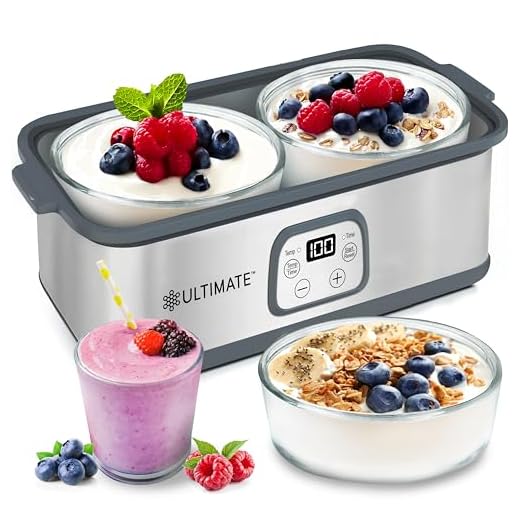

Yogurt starter is a crucial ingredient when making yogurt at home. It contains live cultures of bacteria that ferment milk into yogurt. But what happens if you have more yogurt starter than you can use right away? Can you freeze it to prolong its shelf life?
The answer is yes, you can freeze yogurt starter to extend its lifespan. However, it’s important to know the guidelines for freezing and thawing it to maintain its quality and effectiveness. Freezing yogurt starter can help you preserve the live cultures that are essential for making yogurt.
When you freeze yogurt starter, it goes into a dormant state. The cold temperature slows down the fermentation process and preserves the bacteria. However, keep in mind that freezing may cause some loss of potency, so it’s best to freeze fresh yogurt starter for the best results.
To freeze yogurt starter, make sure it’s in a clean, airtight container. You can use a small freezer-safe plastic container or ice cube trays for individual portions. Fill the container leaving a small space at the top to allow for expansion as the starter freezes.
Yogurt Starter: What is it and How to Store it?
Yogurt starter is a key ingredient in making homemade yogurt. It is a specific combination of live bacteria cultures that are responsible for fermenting the milk and turning it into creamy, tangy yogurt. These cultures include Lactobacillus bulgaricus and Streptococcus thermophilus, which work together to convert lactose into lactic acid.
If you want to make yogurt at home, you’ll need to get your hands on a yogurt starter. This can be obtained in the form of a powdered starter culture or by using a store-bought plain yogurt with active cultures as a starter.
Once you have your yogurt starter, it is important to store it properly to maintain its potency. The best way to store yogurt starter is in the freezer. Freezing the starter suspends the bacterial activity and allows it to remain dormant for an extended period of time.
To store yogurt starter in the freezer, follow these steps:
- Transfer the yogurt starter into small airtight containers or ice cube trays.
- Label each container with the date of freezing to keep track of its freshness.
- Place the containers or ice cube trays in the freezer, ensuring they are tightly sealed to prevent freezer burn.
When properly stored in the freezer, yogurt starter can last for up to one year. However, it is recommended to use the starter within three months for optimal results.
Pro tip: Before using frozen yogurt starter, allow it to thaw in the refrigerator overnight. This will ensure that the bacteria cultures are reactivated and ready to ferment the milk.
In conclusion, yogurt starter is an essential component in making homemade yogurt. By properly storing it in the freezer, you can extend its shelf life and continue to enjoy delicious homemade yogurt for months to come!
Freezing Yogurt Starter: Benefits and Process
Freezing yogurt starter is an excellent way to preserve the culture and extend its shelf life. By freezing the starter, you can ensure that you always have a fresh supply of yogurt culture on hand, even if you don’t plan on making yogurt immediately.
There are several benefits to freezing yogurt starter:
- Prolongs shelf life: Freezing yogurt starter can significantly prolong its shelf life. While fresh yogurt starter can only last for a few weeks in the refrigerator, frozen yogurt starter can last for several months in the freezer.
- Convenience: Freezing yogurt starter allows you to have a backup supply readily available whenever you decide to make yogurt. This can be especially useful if you run out of fresh starter or want to make a larger batch of yogurt.
- Saves money: By freezing yogurt starter, you can save money by buying the starter culture in bulk and using it as needed. This is especially beneficial if you frequently make yogurt at home.
Now that you understand the benefits of freezing yogurt starter, let’s explore the process:
- Prepare the starter: Before freezing, make sure you have the yogurt starter prepared. Follow the instructions provided with the starter culture to ensure you have a healthy and active culture.
- Portion the starter: Divide the prepared starter into small portions. This allows you to thaw only the amount needed when making yogurt, preventing wastage.
- Transfer to a freezer-safe container: Place each portion of the starter into separate freezer-safe containers or freezer bags. Be sure to label each container with the date and type of starter to keep track of its freshness.
- Seal and freeze: Seal the containers tightly and place them in the freezer. Be careful not to leave any air inside the container, as this can cause freezer burn. Freezing at a temperature of -18°C or below is ideal for maintaining the quality of the starter.
- Thawing the starter: When ready to make yogurt, remove the desired portion of starter from the freezer and allow it to thaw in the refrigerator overnight. Alternatively, you can thaw it by placing it in a bowl of cool water.
Remember to use caution when handling and storing frozen yogurt starter to maintain its quality and effectiveness. With proper storage and handling, freezing yogurt starter can be an excellent way to ensure a constant supply of fresh and delicious homemade yogurt.
Shelf Life of Frozen Yogurt Starter: How Long Can it Last?
If you’re an avid yogurt maker, you may be wondering about the shelf life of frozen yogurt starter. Freezing yogurt starter can be a convenient way to have a backup supply on hand or to preserve a batch for future use. But how long can you keep it in the freezer before it goes bad?
The answer to this question depends on several factors, including the quality of the starter and how it is stored. While most frozen yogurt starters can last for up to 12 months in the freezer, it’s important to note that the longer it is stored, the more the quality may deteriorate.
Factors Affecting the Shelf Life of Frozen Yogurt Starter
There are a few factors that can affect the shelf life of frozen yogurt starter:
- Quality of the starter: The quality of the starter itself plays a significant role in determining how long it can last in the freezer. Starter with higher live cultures may have a longer shelf life compared to those with lower live cultures.
- Storage conditions: The way you store your frozen yogurt starter can also impact its shelf life. It is important to keep it in an airtight container or freezer bag to prevent freezer burn and moisture buildup.
- Temperature fluctuations: Frequent temperature fluctuations can negatively affect the quality of the frozen yogurt starter. It is recommended to store it in the coldest part of the freezer, away from the door.
Signs of Spoilage
While frozen yogurt starter can last for an extended period, it is important to know the signs of spoilage. If the starter has an off smell, unusual color, or mold growth, it is best to discard it and not use it for making yogurt.
It’s also worth mentioning that frozen yogurt starter may lose potency over time, resulting in less active cultures. Therefore, it’s a good idea to periodically test the activity of the starter before using it to make yogurt.
In conclusion, frozen yogurt starter can last for up to 12 months in the freezer, but the quality may deteriorate over time. By storing it properly and being mindful of signs of spoilage, you can ensure that your yogurt starter produces the best quality yogurt possible.
Tips for Freezing and Thawing Yogurt Starter
Freezing yogurt starter is a convenient way to ensure that you always have a fresh batch on hand. However, it’s important to follow the proper steps to maintain the quality of the starter. Here are some tips for freezing and thawing yogurt starter:
1. Portion the Starter
Before freezing the yogurt starter, it’s important to portion it out into smaller quantities. This will make it easier to thaw and use only what you need, without having to thaw the entire batch. You can use ice cube trays or small airtight containers to divide the starter into individual servings.
2. Use Freezer-safe Containers
When freezing yogurt starter, make sure to use freezer-safe containers to prevent freezer burn and maintain the quality of the starter. Plastic containers with airtight lids or freezer bags are great options for storing the portions of yogurt starter.
3. Label and Date the Containers
It’s important to label and date the containers before placing them in the freezer. This will help you keep track of the freshness and prevent any confusion when using the frozen yogurt starter. Use a permanent marker or labels to clearly indicate the date of freezing.
4. Thawing the Yogurt Starter
When it’s time to use the frozen yogurt starter, transfer the desired portion to the refrigerator and allow it to thaw overnight. Avoid thawing the starter at room temperature, as this can result in uneven thawing and potential bacterial growth. Thawed yogurt starter should be used within 48 hours.
5. Stir and Resuscitate
After thawing the yogurt starter, give it a good stir to ensure that the cultures are evenly distributed. This will help revive any potentially dormant cultures and promote a healthy fermentation process. It’s also a good idea to let the starter sit at room temperature for a couple of hours to allow it to reach its optimal temperature before using it to make yogurt.
By following these tips, you can safely freeze and thaw yogurt starter without compromising its quality. With a well-stocked freezer, you’ll always be ready to make homemade yogurt whenever the craving strikes!
FAQ
Can I freeze my yogurt starter?
Yes, you can freeze your yogurt starter. Freezing yogurt starter can help preserve its freshness and viability for a longer period of time.
How long can I keep yogurt starter in the freezer?
You can keep yogurt starter in the freezer for up to 12 months. However, it is best to use it within 6 months for optimal results.
What is the best way to freeze yogurt starter?
The best way to freeze yogurt starter is to portion it into small containers or ice cube trays. This way, you can easily thaw only the amount you need for each batch of yogurt.







